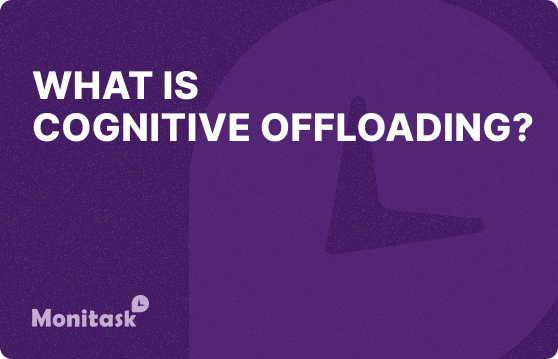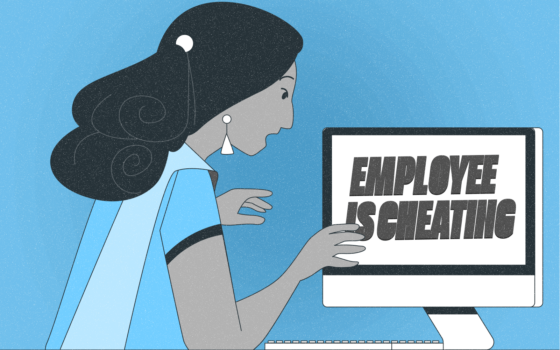What Is Cognitive Offloading?

Cognitive offloading is the practice of using external tools or resources to reduce mental effort and enhance cognitive performance.
Key aspects include:
- Reduces cognitive load
- Improves task efficiency
- Utilizes external memory aids
- Can lead to dependency on tools
- Impacts memory formation and recall
Cognitive offloading, a term gaining traction in HR and organizational psychology, refers to the process of transferring information processing tasks from the brain to external tools or resources.
This strategy aims to reduce mental workload and optimize cognitive performance. As workplaces become increasingly complex and information-rich, understanding and leveraging cognitive offloading can significantly impact employee productivity and well-being
Understanding Cognitive Offloading
At its core, cognitive offloading is about extending our mental capabilities beyond the confines of our brains. It’s a natural human tendency that has evolved with technology. From ancient cave paintings to modern smartphones, we’ve always sought ways to externalize information and processes.
Types of Cognitive Offloading
Cognitive offloading can take various forms, each serving different purposes in the workplace:
| Type | Description | Example |
| Memory Offloading | Storing information externally | Note-taking apps, calendars |
| Computational Offloading | Using tools for calculations | Spreadsheets, calculators |
| Perceptual Offloading | Enhancing sensory input | Data visualizations, infographics |
| Decision Offloading | Relying on external guidance | Decision-making frameworks, AI assistants |
The Science Behind Cognitive Offloading
Recent research in cognitive psychology and neuroscience has shed light on the mechanisms and impacts of cognitive offloading. A 2023 study published in the Journal of Experimental Psychology: General found that individuals who regularly engage in cognitive offloading show increased activation in brain regions associated with meta-cognition and executive function.
Our findings suggest that cognitive offloading doesn’t just free up mental resources; it actually enhances our ability to manage and allocate cognitive resources more effectively.
- Dr. Emily Zhao, lead researcher at the Cognitive Neuroscience Lab, Stanford University
Cognitive Load Theory and Offloading
Cognitive Load Theory, developed by John Sweller in the 1980s, provides a framework for understanding why cognitive offloading can be so effective. The theory posits that our working memory has limited capacity, and by offloading certain tasks, we free up mental resources for more complex processing.
Benefits of Cognitive Offloading in the Workplace
Implementing cognitive offloading strategies can yield numerous benefits for both employees and organizations:
- Enhanced productivity: By reducing mental clutter, employees can focus on high-value tasks.
- Improved decision-making: Offloading routine decisions allows for more thoughtful consideration of complex issues.
- Reduced stress and burnout: Lowering cognitive load can decrease mental fatigue and stress.
- Increased creativity: Freeing up mental resources can foster more innovative thinking.
- Better work-life balance: Efficient cognitive offloading can help employees manage their workload more effectively.
Potential Drawbacks and Considerations
While cognitive offloading offers significant benefits, it’s not without potential drawbacks:
– Decreased ability to recall information without aids
– Reduced mental flexibility
– Potential security risks with sensitive information
– Increased vulnerability to technology failures
A 2024 study by the Workplace Cognition Institute found that employees who excessively rely on digital tools for basic tasks showed a 15% decrease in memory recall for work-related information compared to those who used a balanced approach.
Implementing Cognitive Offloading Strategies in HR
HR professionals can play a crucial role in promoting effective cognitive offloading practices:
1. Training and Development
Develop programs to educate employees on cognitive offloading techniques and their appropriate use. This could include workshops on effective note-taking, time management, and digital tool utilization.
2. Tool Selection and Implementation
Carefully select and implement tools that facilitate cognitive offloading. This might include project management software, knowledge bases, or AI-powered assistants. Ensure these tools integrate well with existing systems and workflows.
3. Creating a Supportive Culture
Foster a work environment that encourages the use of cognitive offloading techniques. This could involve setting up dedicated spaces for focused work or implementing policies that respect employees’ need for uninterrupted time.
4. Monitoring and Evaluation
Regularly assess the impact of cognitive offloading strategies on employee performance and well-being. Use surveys, productivity metrics, and feedback sessions to gauge effectiveness and make necessary adjustments.
The Future of Cognitive Offloading in the Workplace
As technology continues to evolve, so too will our cognitive offloading capabilities. Here are some trends to watch:
- Advanced AI Assistants: More sophisticated AI tools will be able to handle increasingly complex cognitive tasks, further extending our mental capabilities.
- Augmented Reality (AR) Interfaces: AR technology could provide seamless access to information and tools in our visual field, reducing the cognitive load of task-switching.
- Neurotechnology: Emerging brain-computer interfaces may offer direct neural offloading, though this raises significant ethical considerations.
- Personalized Cognitive Support: AI-driven systems could adapt to individual cognitive styles, offering tailored offloading strategies.
Ethical Considerations
As we increasingly rely on cognitive offloading, several ethical questions arise:
– Privacy: How do we protect personal data used in cognitive offloading tools?
– Autonomy: Could excessive offloading lead to a loss of individual agency?
– Equity: How do we ensure equal access to cognitive offloading technologies?
– Cognitive Integrity: What are the long-term effects on our natural cognitive abilities?
HR professionals must be at the forefront of addressing these ethical concerns, ensuring that cognitive offloading strategies are implemented responsibly and equitably.
Measuring the ROI of Cognitive Offloading
Quantifying the return on investment (ROI) of cognitive offloading initiatives can be challenging but is crucial for justifying their implementation. Here’s a framework for measurement:
| Metric | Measurement Method |
| Productivity Increase | Compare task completion times before and after implementation |
| Error Reduction | Track the frequency of mistakes in cognitive-heavy tasks |
| Employee Satisfaction | Conduct surveys on perceived cognitive load and job satisfaction |
| Innovation Metrics | Monitor the number and quality of new ideas or solutions proposed |
| Health Indicators | Track stress-related absences and healthcare costs |
A recent analysis by Deloitte found that companies investing in cognitive offloading strategies saw an average ROI of 150% over two years, with the most significant gains in knowledge-intensive industries.
Further Reading
For those interested in delving deeper into the topic of cognitive offloading, here are some recommended resources:
- Cognitive Offloading: How the Internet Is Increasingly Taking Over Human Memory – Trends in Cognitive Sciences
- The Cognitive Consequences of Digital Offloading – Journal of Experimental Psychology
- Cognitive Offloading in Everyday Life – Cognitive Research: Principles and Implications
By staying informed and adaptable, we can harness the power of cognitive offloading to create more efficient, innovative, and human-centric workplaces.
Conclusion
Cognitive offloading represents a powerful tool in the modern workplace, offering the potential to enhance productivity, creativity, and employee well-being. However, its implementation requires careful consideration of both its benefits and potential drawbacks. As HR professionals, our role is to guide organizations in leveraging these strategies effectively while addressing ethical concerns and ensuring equitable access.
As we navigate the evolving landscape of work, cognitive offloading will undoubtedly play an increasingly important role. By staying informed about the latest research and best practices, we can help create work environments that not only boost performance but also support the cognitive health and satisfaction of our employees.
Remember, the goal of cognitive offloading isn’t to replace human thinking, but to augment and enhance our natural cognitive abilities. When implemented thoughtfully, it can lead to more fulfilling, productive, and innovative workplaces.
– The Monitask Team


